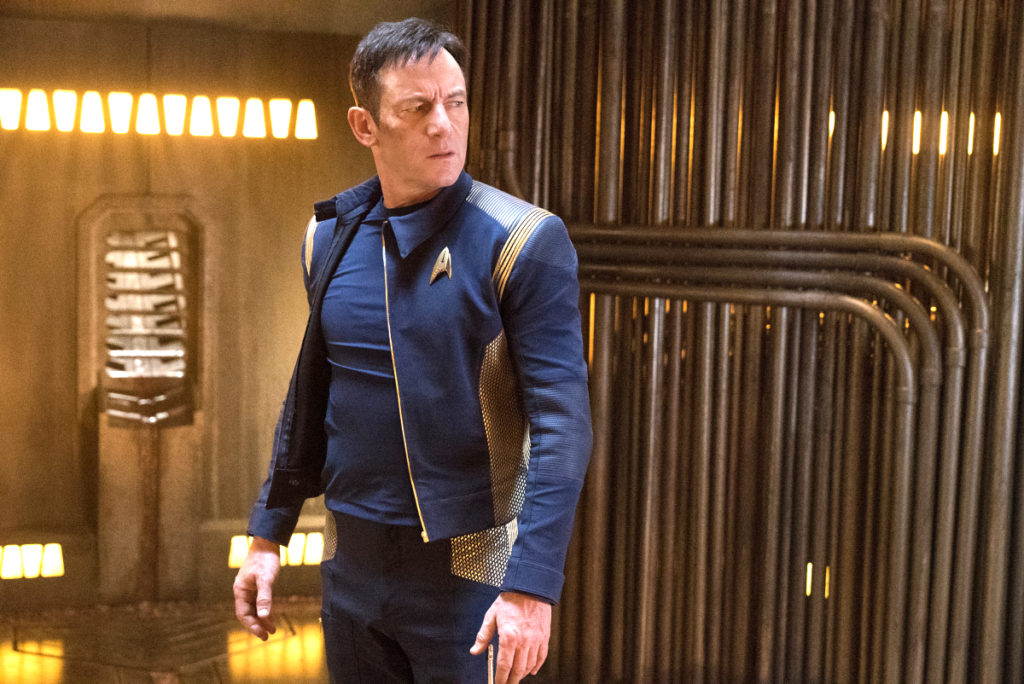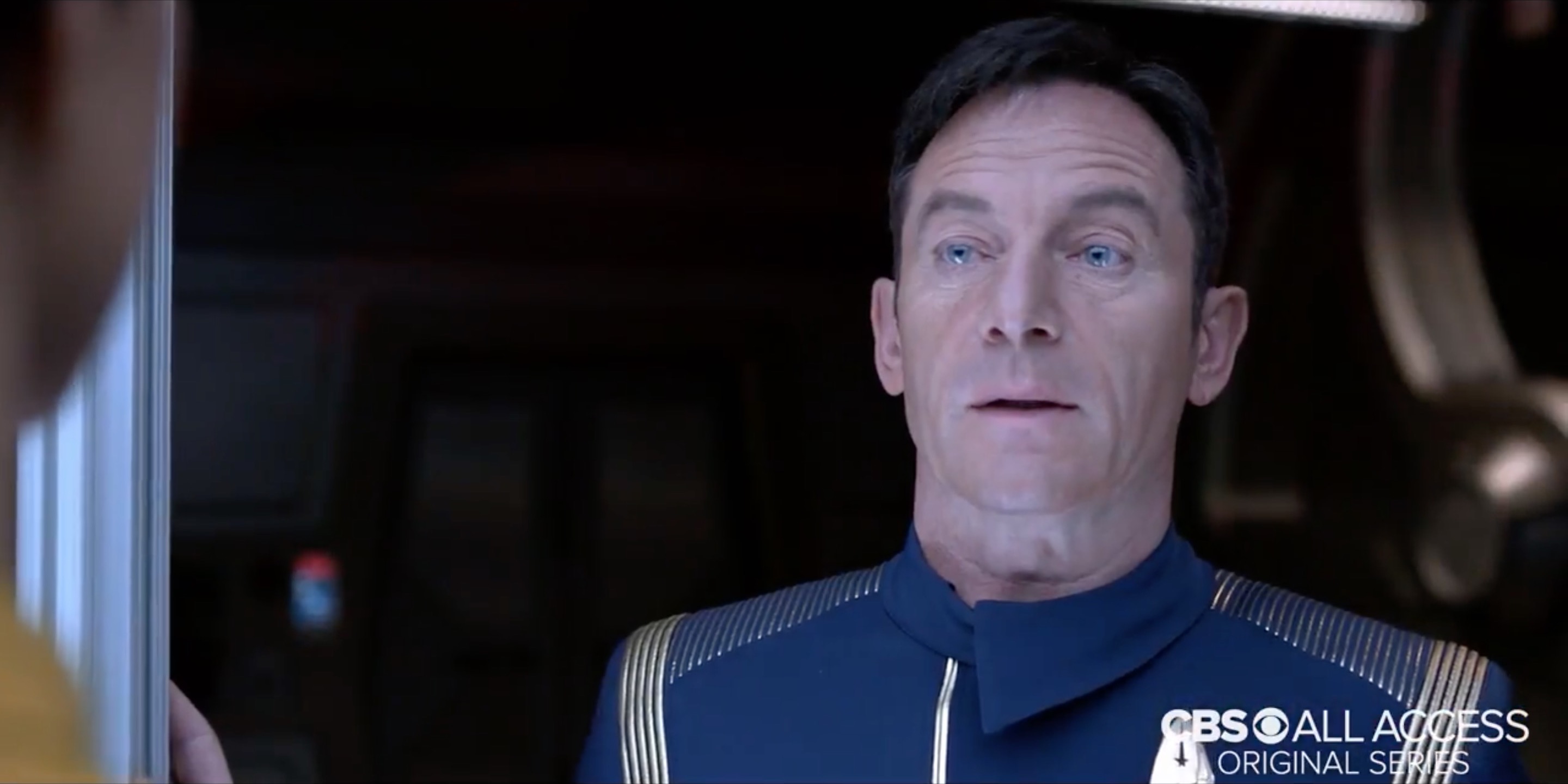(The following contains only minor thematic spoilers for Star Trek Discovery and might help you decide if you want to watch it.)
There’s an implicit contract between the Star Trek franchise and its fandom and it goes something like this: The future will be remarkably better than the present because humanity will grow. Star Trek argues the saying “the more things change, the more they stay the same” is a dangerous lie that undermines and distorts human potential. This optimism about human potential and growth is what has made Star Trek different from every other space franchise. In a sixties in which America was throwing off the oppressive conformity of the post war decade, is it any wonder that the original series touched something? Star Trek the original series says, not only will we go to the moon, but we will go further, and we will be better for it.
But the implicit contract with fans goes a step further. Part of the appeal of every Star Trek product is that you go in knowing that you will, in general, see humanity at its best facing down problems that we twentieth century mortals would fail. In this way Star trek functions to call out the best in its fans, to challenge them to evolve and become more like Kirk, Picard, Sisko, and Janeway, and less like the villains these upright and honorable heroes face down each week.
If there are exceptions, they prove the rule. Consider this clip my favorite episode of Deep Space Nine, In the Pale Moonlight. For me it’s the greatest moment in Star Trek history.
https://youtu.be/StF9jrhw-pU
In this moment we learn that Sisko is better than us because he can’t do what needs doing without cost to himself. The terrible cost paid? A dirty conscience—a penalty Sisko thinks can live with. This episode and the one before it Inquisition are two of the most hotly debated Star Trek episodes ever produced precisely because they challenge the vision of the future in which humanity has it all together. But in the end, they only provide a needed contrast, a way to highlight the true culture of Star Fleet. In Star Trek, humanity has become honorable, and fans watch it to enlarge their hope that in the future we as a species will follow that path.
Every show, and every film has been faithful to this vision, until now. Star Trek Discovery has gleefully placed a photon torpedo right through the vulnerable neck of this contract, and he’s sitting in the captain’s chair, and I think fans have a right to feel betrayed. This isn’t the Star Trek they love, not by any means. Captain Lorca would murder and lie every day of the week and twice on Sundays if it would bring him a victory in the Federation war with the Klingons, and he’d have no twinge of conscience at all. Worse still he is the Anti-Picard. A devil who regularly manipulates his crew for his own purposes, using their naivety and Star Fleet goody-two-shoes attitudes for his own dishonorable purposes. This is a universe in which humanity has not finished its evolution.
I understand their anger, but I don’t share it. In fact, I think that the first nine episodes of Star Trek Discovery have been one of the most enjoyable media experiences I’ve had in a long time. I can’t recall the last time a Star Trek show had me cry, and I did cry during episode nine, and I was glad about it. That might be a first for me when it comes to television. I’m a writer, and most of the time when you ring an emotion out of me, I know I’m being conned. I can see the man behind the curtain, and I am pissed that you made me feel anything. (I’m looking at you Sherlock.) Not this time. This time I loved it.
Are there problems with the show. Yes, tons. A long list of them that I won’t mention here. Most of all, I’m not at all sure that I trust the writers. I’m not sure they understood the contract when the broke it. And so I’m not sure they won’t permanently screw up a franchise that was already reeling from J.J. Abrams. There’s a lot riding on Discovery, if it goes badly Star Trek could end up in the dustbin, and CBS will have no clue what they did. They already decided to sue their fans and set harsh rules on fan films, a totally stupid move. Managing a fanbase is an act of judo not karate, you don’t attack them, you use their momentum to make them go where you want them to go.

So why don’t I share a fan’s anger over the loss of an optimistic future in Discovery? There are a couple of reasons. First, the optimistic future is all over the Discovery, it’s just not in the Captain’s chair. The values of Star Trek reside in the crew, and that is a major change, but IF—and it’s a huge if—the writers allow those values to rise to the surface and overcome the broken humanity on the Discovery, then we will have something. The franchise might be preserved. My writer “spidey sense” is that this is the direction of the overall plot, but it remains to be seen what they do long term because this battle between the captain and the values is set up as the central conflict of the show. It’s like a “will they or won’t they” dynamic on a rom-com. When they do, the show is over. So I worry that they will extend this battle far too long into the future, but there is still a chance the writers will handle it well.
Second, the zeitgeist has changed since 1966 or even 1996, and I think this dynamic of the crew at first being manipulated by and then hopefully fighting against the captain is a good metaphor for the present. No one trusts our government in the United States, and outside of the bros in silicon valley, technology based optimism has rightfully tempered. If the values of decency and optimism and hope reside anywhere, it is with the people of the United States, and not with her Captains. In this way, I think Discovery is right to put the values of Gene Roddenberry and his vision of the future under stress. In so doing the show challenges us to preserve them and not be naive when the politicians come calling and ask us to use them for their own purposes.
The jury is still out on these two hopes of mine. It remains to be seen if Discovery will place Star Trek values back at the center of the franchise. I for one hope they will. I hope this will mean a comeuppance for Lorca and not a redemption. I’m secretly hoping that Michael Burnham will face the same decision she did in episode one and have to make the same call. That would be good television indeed.
